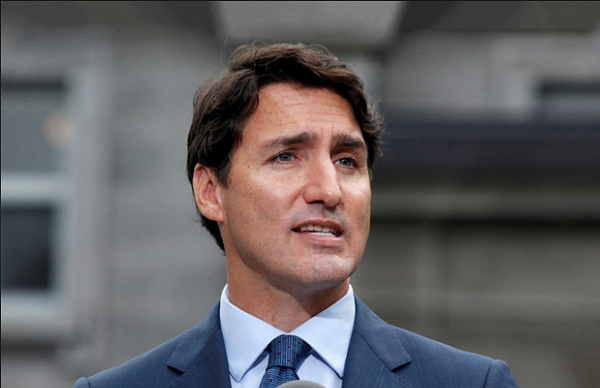Tariff threats for Canada: Trudeau says threats are at odds with ‘golden age’ touted in Trump’s inauguration speech
Prime Minister Justin Trudeau said the era of prosperity Donald Trump promised in his inauguration speech is at odds with the threats the U.S. President is making to impose steep tariffs on Canada.
Mr. Trump’s plan for U.S. economic growth requires Canadian commodities, but punitive tariffs he’s threatened for Feb. 1 would raise costs for all these goods, Mr. Trudeau said.
“President Trump said that he wants to usher in a golden age for the United States that will require more steel and aluminum, more critical minerals, more reliable and affordable energy, more of everything to run the U.S. economy full steam ahead,” the Prime Minister told reporters outside a cabinet retreat in Montebello, Que., Tuesday.
“Canada has all those resources, and we stand at the ready to work with the United States to create a booming and secure North American economy,” he said. “Of course, if the President does choose to proceed with tariffs on Canada, Canada will respond, and everything is on the table.”
In the face of continuing confusion over when Trump tariffs may hit Canada, Mr. Trudeau and other political leaders each championed their existing ideas for persuading the White House to alter course. The Prime Minister will host a virtual meeting Wednesday with provincial and territorial premiers.
Mr. Trump was sworn in Monday and excluded talk of tariffs on Canadian goods from his inauguration address. Further, he did not immediately impose a 25-per-cent tariff on goods from Canada and Mexico, as he had promised to do ahead of returning to power. This gave politicians and policy makers in Canada some hope, which Mr. Trump extinguished Monday evening when he said he was thinking about introducing those levies Feb. 1.
However, a memorandum posted on the White House’s website indicates a different timeline, ending April 1. It directs the U.S. Secretary of Commerce, by this date, “in consultation with the Secretary of the Treasury and the United States Trade Representative,” to investigate the United States’ trade deficits with major trading partners and also assess “unlawful migration and fentanyl flows” from Canada, Mexico and China into the United States “and recommend appropriate trade and national security measures to resolve that emergency.”
On Tuesday, The Wall Street Journal reported that Mr. Trump is using the threat of tariffs to press Canada and Mexico to begin early renegotiations on the trilateral United States-Mexico-Canada Agreement that was scheduled to be up for renewal in 2026. Mr. Trump denied this in a late-afternoon press conference.
Kirsten Hillman, Canada’s ambassador to the United States, said “Canada is always ready” when asked whether Ottawa was prepared to renegotiate the trade agreement.
Immigration Minister Marc Miller agreed, but said Canada should gird itself for unexpected developments when dealing with the Trump administration.
“Let’s get ready to dig in for the next four years and let’s not be surprised by any surprises anymore,” Mr. Miller said.
Asked whether this meant renegotiating the USMCA early, the minister said: “We’re going to fight for Canada and fight for the best deal we can get.”
He said Canada shouldn’t assume matters with Mr. Trump will be resolved quickly.
“This is stuff that’s not going to end with any one negotiation tactic or any one series of back and forth or travel to Mar-a-Lago,” he said.
Former Quebec premier Jean Charest, who is part of a council advising Mr. Trudeau on U.S. relations, said Mr. Trump’s goals conflict. Multiple forecasts have predicted American tariffs and an ensuing trade war would hurt both Canada and the U.S. economy. “The tariff agenda is the contrary of economic growth.”
Even without the tariffs, the Canadian economy is already feeling the impact of Mr. Trump’s threats as businesses delay investment decisions in the face of uncertainty, another trade council adviser, Flavio Volpe, president of the Auto Parts Manufacturers Association, told reporters. “What we’re seeing in the business sector that I represent is, if someone can delay a decision, then they are.”
The new President has demonstrated a persistent fixation with a U.S. trade deficit with Canada that amounts to approximately $100-billion a year. Canadian officials say this reflects significant petroleum sales to the United States.
This lack of clarity regarding Mr. Trump’s intentions is part of the White House’s strategy, Mr. Trudeau said.
“Donald Trump is, as always, a skilled negotiator, and will do what he can to keep his negotiating partners a little bit off balance.”
Mr. Trudeau warned Tuesday that Canada stands ready to respond with retaliatory levies on U.S. imports. “I support the principle of dollar-for-dollar matching tariffs.”
As The Globe and Mail first reported last week, Canada’s first round of retaliatory tariffs would cover $37-billion of U.S. imports. These would be the least painful countertariffs because they would cause the least economic damage to Canadians, officials said. Depending on how hefty initial U.S. tariffs on Canada are, Ottawa would then move to tariffs covering another $110-billion or so of American goods.
On Tuesday, Alberta Premier Danielle Smith defended her own campaign to dissuade Mr. Trump from imposing tariffs on Canadian goods without any threats of retaliation as the country’s best bet in warding off punishing levies.
Her gentle approach to diplomacy contrasts with the firmer stand Mr. Trudeau and the rest of the country’s premiers have adopted.
Ms. Smith, who is in Washington for the inauguration and subsequent celebrations, told reporters that while her strategy has yet to produce results, she believes Mr. Trump would be open to a deal.
“My interpretation of the President is that he likes to win,” she said, when asked why she favours diplomacy when trying to negotiate with a leader who has repeatedly shown admiration for muscular power. “So it is up to us to demonstrate how we can get a double win here.”
Ms. Smith told reporters she did not think oil and gas exports from Alberta would receive an exemption from Trump tariffs. “There’s no question this President is enthusiastic about tariffs.”
Because Mr. Trump wants the United States to become a major exporter of oil and gas, crowding out rivals and supporting allies, Ms. Smith said she is trying to demonstrate that Alberta can help the President achieve his goal. The U.S. consumes about 20 million barrels of oil a day but produces just 13 million, so fossil fuels from Canada can “backfill” domestic demand and support Mr. Trump’s export ambitions, Ms. Smith argued.
Ontario Premier Doug Ford continued to promote his idea for a new pact with the United States to promote trade, energy and economic growth he calls “Fortress Am-Can.” In a post on X, he said “President Trump seems intent on starting a trade war that will create the kind of economic uncertainty that only benefits China. There’s a better way. Let’s beat China with Fortress Am-Can.”
B.C. Premier David Eby called on Canadians to use their consumer clout in the brewing trade war with the United States, and to think carefully about spending their dollars on U.S. holidays.
Mr. Eby said he is considering an array of retaliatory measures including a ban on U.S. products on the shelves in B.C. liquor stores.
Ms. Hillman, Canada’s ambassador to the United States, said Mr. Trump’s “America First Trade Policy” – which lays out a deadline for April 1 for recommendations for trade action – finally gives Ottawa something concrete to address.
“The most important thing that came out of that is that we have now moved from a more abstract discussion with the Trump administration to a very concrete discussion,” she told reporters at the cabinet retreat.
Innovation Minister François-Philippe Champagne said Ottawa must now aggressively sell Mr. Trump on the idea that they have common cause and purpose in placing barriers on efforts by China to buy strategic assets in North America.
“We need to move from a defensive position to offensive in the sense that we have a lot of good things to put on the table in that discussion,” Mr. Champagne said.
He noted Mr. Trump’s executive actions, including investigating concerns about protecting critical supply chains from Chinese state influence.
“Canada is probably being the most aligned country in the world when it comes to protecting our critical supply chain,” he said, adding later “we have taken a number of positions, whether on research security, whether on banning certain types of investment, directing divestment, for example, in critical minerals, to protect critical supply chains.”
Conservative Leader Pierre Poilievre urged the government to recall Parliament, which Mr. Trudeau prorogued.
Mr. Poilievre said MPs need to be sitting to discuss a plan to retaliate against the United States and support Canadians and businesses affected by a trade war.
Manitoba Premier Wab Kinew said his government is considering “a series of quick responses” for businesses in the province, such as financial stimulus to provide stability, should U.S. tariffs come into effect.
“Our hope is that, in the first instance, we can preserve the trade relationship as it is. If things get to a more challenging position, we have a series of contingency plans,” he told reporters Tuesday at an unrelated event in Brandon, Man.
British Columbia’s First Nations leaders are demanding a seat at the table as Canada develops its tactics in response to tariffs.
The tariff threat is a major focus as the annual meeting of the provincial government with leaders representing B.C.’s 204 First Nations communities this week. In her opening remarks, Chief Cheryl Casimer, First Nations Summit political executive, told reporters the lack of Indigenous representation will not help Canada present a unified front in trade talks.
“We haven’t been invited to be part of Team Canada yet, and that’s why I just really want to emphasize the importance of that needing to happen. That needs to take place before any further discussions continue to advance,” she said.
“Otherwise, we’re going to find ourselves in a situation where there could be potential conflict, and we don’t want that. We can’t afford that here in Canada right now. We need to be allies.”
This article was first reported by The Globe and Mail













